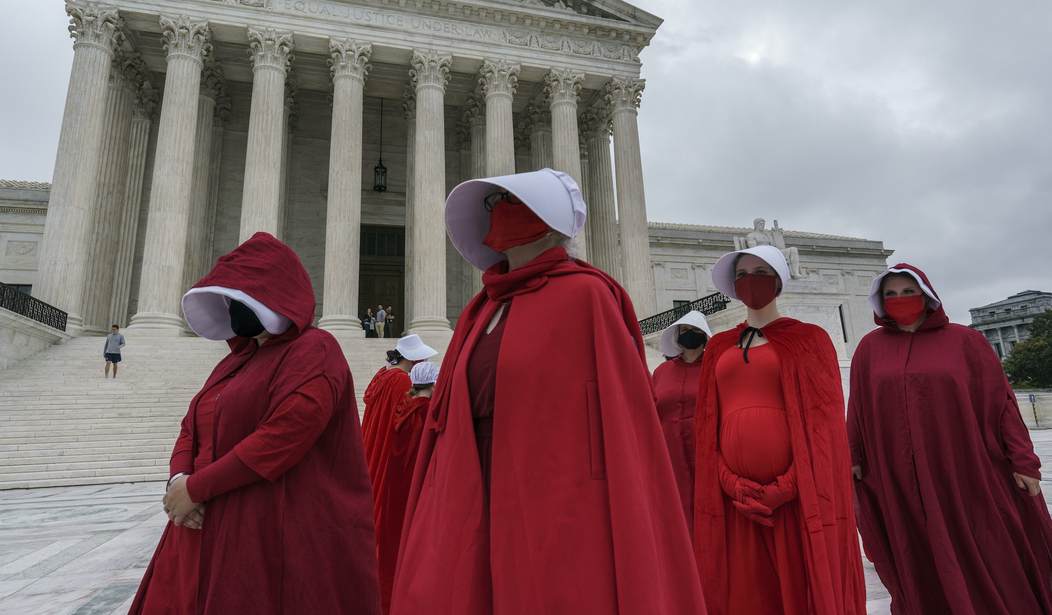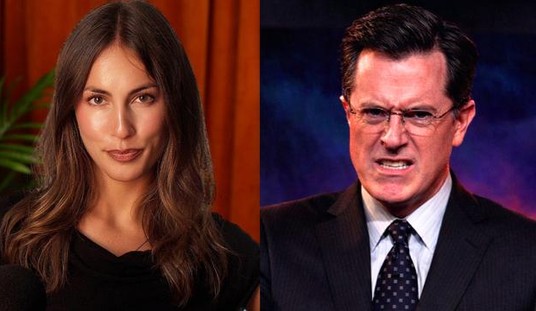The evening before Thanksgiving Day, the Supreme Court issued an injunction preventing Gov. Andrew Cuomo (D-N.Y.) from imposing extremely harsh COVID-19 restrictions on religious gatherings, capping religious services at 10 people. According to prominent former Harvard law professor Laurence Tribe and Cornell law professor Michael C. Dorff, the Court’s decision to preserve religious liberty threatened to usher in a misogynistic dystopia like the one in Margaret Atwood’s book The Handmaid’s Tale.
Yes, seriously, these well-established legal minds compared a Supreme Court decision on religious freedom amid the COVID-19 pandemic to a dystopia that deprives women of the rights to vote, to own property, and to work, and which singles out fertile women to be systematically raped in order to bear children for powerful men.
The mental gymnastics required to go from a limited legal case to “OMG! It’s THE HANDMAID’S TALE, GUYS!!!!!” might be impressive, had the Left not repeatedly resorted to this insane tactic in the past. Pro-abortion activists have donned Handmaid’s Tale outfits, claiming that any restriction on abortion is effectively tantamount to removing women’s rights and forcing them to become broodmares. Leftists also compared the Republican attempt to replace Obamacare with The Handmaid’s Tale. Left-leaning protesters donned handmaid outfits to protest Supreme Court nominee Amy Coney Barrett’s confirmation hearing.
Yet these activists were not well-established legal professors commenting on a recent Supreme Court decision. When Tribe and Dorff compare a Court decision to The Handmaid’s Tale, people might be inclined to listen. So how did the law professors see a misogynistic dystopia in the Supreme Court’s tea leaves?
The Supreme Court’s injunction in Roman Catholic Diocese of Brooklyn v. Cuomo temporarily prevented Cuomo from restricting religious services to 10 people or fewer in a “red zone” near a COVID-19 hotspot, until the 2nd Circuit Court of Appeals can decide the full case. Tribe and Dorff argued that the injunction was unnecessary because the church and synagogue involved were no longer in “red zones,” but the restrictions would still apply should another hotspot emerge.
The Left’s Latest ‘Handmaid’s Tale’ Attack on Amy Coney Barrett Reeks of Desperation
In an unnamed opinion, the Supreme Court ruled that Cuomo’s order was likely unconstitutional as it singled out churches and synagogues for adverse treatment, so it would have to face the test of strict scrutiny, a high legal bar. In a previous COVID-19 religious freedom ruling, Chief Justice John Roberts had relied on Jacobson v. Massachusetts (1905), in which the Supreme Court allowed Massachusetts to mandate a smallpox vaccine amid a smallpox pandemic, overruling Henning Jacobson’s claim that the vaccine mandate violated his right to bodily autonomy.
In his concurring opinion on the eve of Thanksgiving, Justice Neil Gorsuch rejected Roberts’ use of Jacobson, claiming that pandemic restrictions on religious freedom must meet a higher legal test than those on bodily autonomy.
“Even if judges may impose emergency restrictions on rights that some of them have found hiding in the Constitution’s penumbras, it does not follow that the same fate should befall the textually explicit right to religious exercise,” Gorsuch wrote.
Tribe and Dorff called this statement “a legal dog whistle.” They argued that the terms “substantive due process,” “bodily integrity,” and “penumbras” are each “closely associated with Supreme Court precedents recognizing a right to privacy that encompasses contraception, abortion, child rearing, choice of sexual partners, control over one’s intimate private information and determination of how one faces death.”
“Religion, Gorsuch clearly implied, is a genuine constitutional right enshrined in the text, whereas these other rights are just made up and not entitled to similar respect,” the law professors argued.
This argument cuts right to the heart of the debate about the expansion of “rights” the Constitution supposedly protects, despite evidence that the Founders did not consider them rights at the time. The Supreme Court effectively invented rights like the right to abortion and the right to same-sex marriage by claiming to discover these rights in the “penumbras” of the Fourteenth Amendment.
While the Ninth Amendment does prohibit the federal government from abridging rights not specifically enumerated by the Constitution, that does not provide a blank check for the Supreme Court to create new rights out of whole cloth.
Interestingly, Tribe and Dorff added “how one faces death” to the list of “unenumerated rights” that Gorsuch’s Originalist philosophy might endanger. As Albert Mohler, president of Southern Baptist Theological Seminary, pointed out, there is no Supreme Court case enshrining euthanasia into law in the same way that Roe v. Wade (1973) legalized abortion. This reference to euthanasia illustrates the danger of Tribe and Dorff’s philosophy regarding unenumerated rights.
Yet Tribe and Dorff equate Gorsuch’s jab at the kind of jurisprudence behind Roe v. Wade to an Originalist revolution in Supreme Court jurisprudence that would destroy all the rights the Ninth Amendment exists to protect.
Orthodox Jewish Rabbis Sue Cuomo for ‘Blatantly Anti-Semitic’ COVID Order
“If, as Gorsuch implied, the Constitution subjects laws governing the human body to only minimal scrutiny, then laws mandating abortion would be valid, because such laws rationally advance an interest in population control and could be put to frightening eugenic ends,” Tribe and Dorff argue. Yet Gorsuch’s attack on the abuses of unenumerated rights does not mean the Supreme Court would destroy the right to bodily autonomy in this grotesque fashion.
That does not stop Tribe and Dorff from going further, however. They conclude their article by noting Joe Biden’s words that “America is back” after his (still disputed) election victory. The left-leaning professors claim America will be “back” on January 20, 2021.
“But at the Supreme Court, America is increasingly unrecognizable. A court that affords no protection to unenumerated rights to bodily integrity and privacy, while simultaneously eroding the separation of church and state would look less like our familiar institution and more like the highest judicial authority of a place like Gilead — the theocratic and misogynist country in Margaret Atwood’s dystopian ‘The Handmaid’s Tale,'” the professors conclude.
Note to Tribe and Dorff: defending religious freedom against government abuses taken in the name of COVID-19 is nothing like The Handmaid’s Tale. But your rush to such an extreme argument — and your bizarre suggestion that the Constitution includes an unenumerated right to euthanasia — only reinforces the need for Originalism of the sort that Neil Gorsuch espouses (in cases other than Bostock v. Clayton County, that is).
Editor’s Note: Want to support PJ Media so we can expose and fight the Left’s radical plans for the Supreme Court? They will stop at nothing, so your support for conservative journalism is more important than ever. Join PJ Media VIP and use the promo code SCOTUS to get 25% off your VIP membership.
Tyler O’Neil is the author of Making Hate Pay: The Corruption of the Southern Poverty Law Center. Follow him on Twitter at @Tyler2ONeil.









Join the conversation as a VIP Member